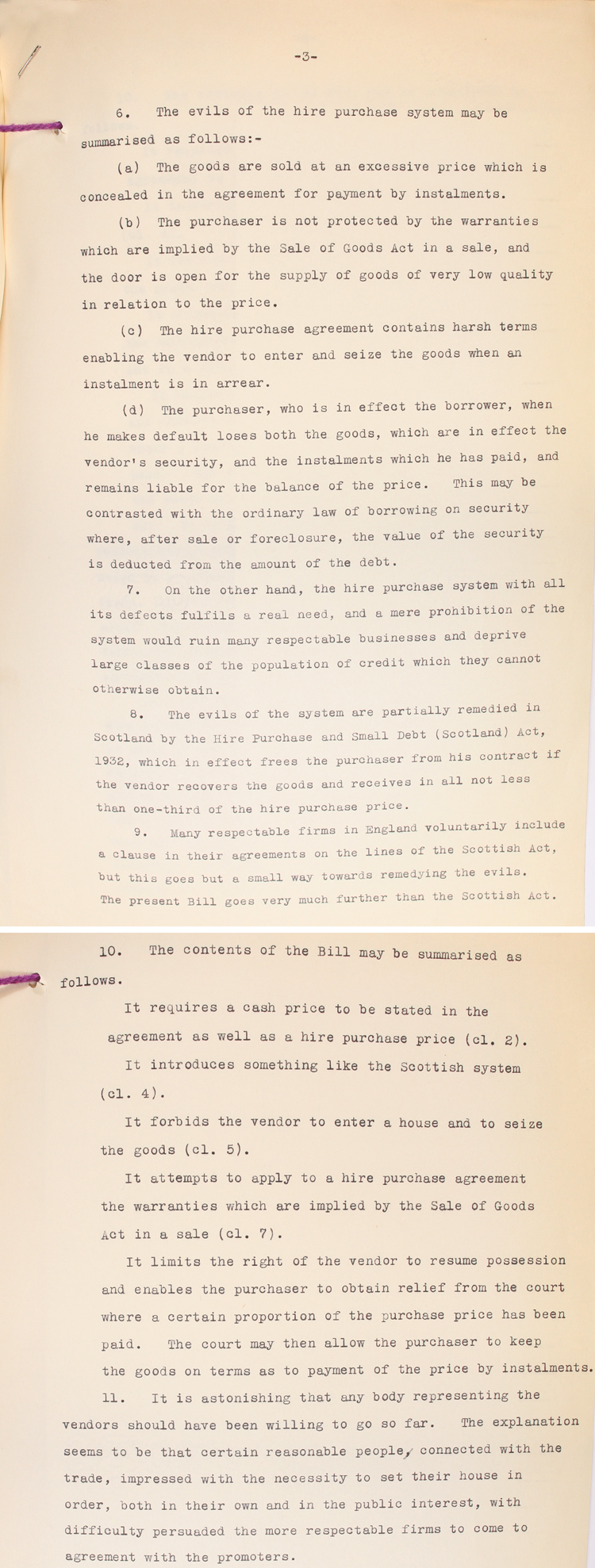
Extracts from a report to the Lord Chancellor summarising the ‘evils’ of the hire purchase system and Labour MP Ellen Wilkinson’s Bill to change the law on hire purchase, 3rd December 1937 (LCO 2/1511)
Transcript
…
6. The evils of the hire purchase system may be summarised as follows:-
(a) The goods are sold at an excessive price which is concealed in the agreement for payment by instalments.
(b) The purchaser is not protected by the warranties which are implied by the Sale of Goods Act in a sale, and the door is open for the supply of very low quality in relation to the price.
(c) The hire purchase agreement contains harsh terms enabling the vendor to enter and seize the goods when an instalment is in arrear.
(d) The purchaser, who is in effect the borrower, when he makes default loses both the goods, which are in effect the vendor’s security, and the instalments which he has paid, and remains liable for the balance of the price. This may be contrasted with the ordinary law of borrowing on security where, after sale or foreclosure, the value of the security is deducted from the amount of the debt.
7. On the other hand, the hire purchase system with all its defects fulfils a real need, and a mere prohibition of the system would ruin many respectable businesses and deprive large classes of the population of credit which they cannot otherwise obtain.
8. The evils of the system are partially remedied in Scotland by the Hire Purchase and Small Debt (Scotland) Act, 1932, which in effect frees the purchaser from his contract if the vendor recovers the goods and receives in all not less than one-third of the hire purchase price.
9. Many respectable firms in England voluntarily include a clause in their agreements on the lines of the Scottish Act, but this goes but a small way towards remedying the evils. The present Bill goes very much further than the Scottish Act.
10. The contents of the Bill may be summarised as follows. It requires a cash price to be stated in the agreement as well as a hire purchase price (cl. 2). It introduces something like the Scottish system (cl. 4). It forbids the vendor to enter a house and to seize the goods (cl. 5). It attempts to apply to a hire purchase agreement the warranties which are implied by the Sale of Goods Act in a sale (cl. 7). It limits the right of the vendor to resume possession and enables the purchaser to obtain relief from the court where a certain proportion of the purchase price has been paid. The court may then allow the purchaser to keep the goods on terms as to payment of the price by instalments.
11. It is astonishing that any body representing the vendors should have been willing to go so far. The explanation seems to be that certain reasonable people, connected with the trade, impressed with the necessity to set their house in order, both in their own and in the public interest, with difficulty persuaded the more respectable firms to come to agreement with the promoters.
…
